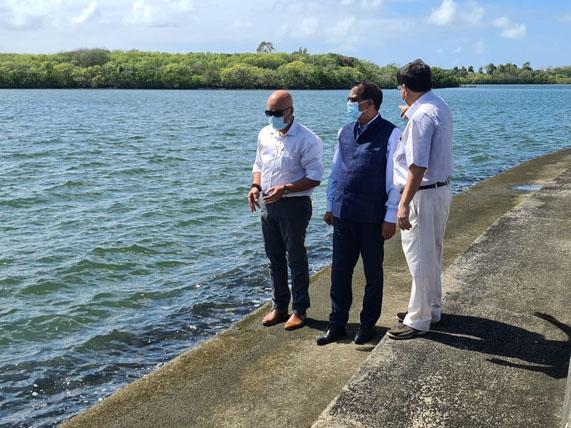Africa-Press – Mauritius. Around 10 000 ‘gueule pavée’ juveniles have been released, today, in the lagoon of Poste de Flacq by the Albion Fisheries and Research Centre in line with the Marine Ranching Programme of the Ministry of Blue Economy, Marine Resources, Fisheries, Shipping.
Some 150 000 ‘gueule pavée’ juveniles will be released in lagoons at suitable sites in the coming days, namely at: Albion, Pointe aux Sables, Sable Noire, Riviere Noire, Balaclava Marine Park, Grande Rivière Sud Est, and Blue Bay Marine Park.
Present on this occasion, the Minister of Blue Economy, Marine Resources, Fisheries, Shipping, Mr Sudheer Maudhoo recalled that the stocking of the lagoon with fingerlings remains an important item on Government’s agenda.
He underlined the need to maintain fishing as part of the country’s economic activity and to ensure that fisheries are sustainable. He acknowledged that aquatic ecosystems are confronted by environmental and climatic threats which call for an integrated ecosystem approach for the management of the habitats.
To that end, he highlighted that it is important to give the ocean the opportunity to restock itself by providing it with a proper mechanism. In this regard, the Ministry has embarked on the Marine Ranching Programme for the release of fish fingerlings in the lagoon, he added.
Mr Maudhoo further lauded the benefits of fish stocking such as increasing existing stock and added that it is recognised for its importance to the fishing community in terms of quality fishing, conservation outcomes, employment, and subsequent economic benefits.
Fish stocking must be conducted responsibly to conserve and protect our unique biodiversity, he pointed out. Marine Ranching Programme
Marine ranching is a process whereby seeds of desired species of marine animals are collected or produced, reared and released in the sea to enhance the natural population.
The fingerlings/juveniles are grown to a predetermined size, released in the sea in view of replenishing the lagoon for their eventual capture at marketable size by the local fishers.
The Ministry has embarked on a Marine Ranching Programme whereby fish fingerlings are being produced at the Albion Fisheries Research Centre for release at selected sites in the lagoon to increase the stock potential.
Species targeted for marine ranching are the ‘cordonnier’, mud crab, ‘gueule pavée’, and marine shrimp. At the Albion Fisheries Research Centre, two methods are presently being used for fish propagation namely harvest type and recruit type.
In harvest type, fry are collected from the wild during the spawning season in November and December. The fry are then reared in the ponds at Albion until they attain an average weight of 10g and size 8cm.
These fingerlings are then released back to the lagoon around the country. In the recruit type method, the sea bream (gueule pavée) are induced to spawn the hatchery. The fry obtained are then cultured for about two months prior to releasing the fingerlings at sea.
For More News And Analysis About Mauritius Follow Africa-Press







